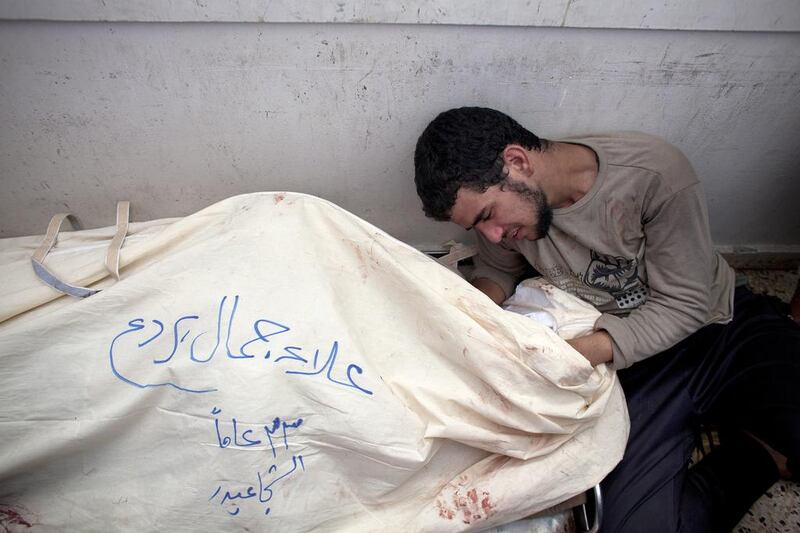GAZA CITY // The families left in droves, many carrying all the possessions that they had managed to grab in plastic bags as they fled for their lives.
The exodus started at first light on Sunday, with residents of the Shujaieh neighbourhood fleeing unrelenting artillery fire that began the night before and smashed homes, crushed cars, splintered trees and killed at least 66 people.
Many of the survivors could only think of one place to turn for some sense of certainty — Shifa Hospital.
The hospital had become a hub of activity for Palestinians since Israel launched its offensive 13 days ago. The complex and surrounding area have played host to Hamas press conferences, hurried shopping at nearby markets and a place to catch taxis.
On Sunday, it became a makeshift camp for Palestinians displaced by the bombardment.
“We have nothing. Where can we go?” said Sanaa Gharabli, 43, who fled Shujaieh with 30 relatives.
They had walked five kilometres to reach Shifa and join hundreds of neighbours and friends from the besieged neighbourhood. Like many, she had nowhere else to go. Egypt, which has helped tighten the Israeli siege over the last year, has closed its border crossing with the territory, hemming in Gazans even further.
“They’re killing us! They’re killing us!” Ms Gharabli responded, when asked where she had come from.
Their exodus is the second since Israel launched its offensive to stop heavy rocket fire from the Hamas-run territory, as well as to destroy tunnels that Palestinian fighters have used to attack it.
The first flow of internally displaced Palestinians occurred a week ago amid threats of an Israeli ground invasion that, commencing on Thursday evening with an intensification of airstrikes and shelling, forced thousands of people from northern Gaza to take shelter in United Nations-run schools.
The internally displaced are taxing the Israeli-besieged territory’s 1.8 million people and their already fragile economy, amid worsening power outages and shortages of water.
The number of people seeking shelter at UN schools had reached 81,000 by Sunday afternoon, said Christopher Gunness, spokesman for its Relief and Works Agency, which assists Palestinian refugees.
“That the number of people looking for sanctuary has tripled over the last three days gives you an idea of the scale” of the crisis, he said.
Ahmed Shella arrived at one of the UN schools on Sunday morning. Also a resident of Shujaieh, he had his two young children, wife and mother in tow.
Having left in such haste, Mr Shella, 22, forgot his shoes.
Standing barefoot in the school’s blue-and-white courtyard, he described seeing the mangled bodies of what he said were 10 members of Shujaieh’s Ayyad family in the street.
There was nothing Mr Shella could do for them, he said. The incoming attacks gave him little option but to flee.
“There was no one there to save them.”
Nor could anyone save his friend and neighbour, Adel Isleem, 40, and his two-year-old daughter, Dalia. As he left his home, Mr Shella recalled seeing Adel’s cousin crying in the street as he yelled into his mobile phone.
“He was screaming: ‘Adel and Dalia are martyred! They’re martyred’,” Mr Shella said of the cousin.
Adel and Dalia’s bodies arrived at the morgue in Shifa hospital to crowds chanting “Allahu Akbar! Allahu Akbar”!
Sharif Abu Amra, 28, a neighbour of Adel and Dalia, was among the crowd. He watched in shock.
He said he saw bodies of the father and daughter on the first floor of their home.
“The top of the daughter’s head was sliced off,” he said, referring to Dalia.
There was anger among those taking refuge at the hospital — directed not just at Israel but also, for a few grieving family members, at Hamas, the Islamist movement that has controlled Gaza since capturing the territory in 2007.
Some of the group’s leaders have called for civilians to stay in their homes despite the Israeli attacks.
Standing in front of television crews at the hospital’s entrance, Fawzi Barhoum, a Hamas spokesman, gave a fiery speech against Israel. Another spokesmen for the group, Sami Abu Zuhri, called the attack a “an atrocious massacre” and said “it would not break the resistance or the will of the Palestinian people”.
A two-hour humanitarian ceasefire to rescue the wounded and pull bodies from the rubble in Shujaieh collapsed after 40 minutes on Sunday afternoon.
Israel accused Hamas of continuing to fire rockets.
Many of those who fled were still in shock from the intensity of the violence they saw in Shujaieh, including 38-year-old Palestinian woman Dalia Helles.
Along with dozens of other families, she was sitting in the grassy courtyard behind Shifa with her six children. None of her family members had been killed, but she expressed concern about her 11-year-old daughter, Rana.
“She has a heart condition. I don’t know if she can take this stress.”
Standing next to his barefoot son, two-year-old Mohammed, Salman Shakhsa was asking people in the area to lend him cash. He had left everything at home, including Mohammed’s shoes.
But what concerned him more was his wife, Asmaa, 30. She is four-months pregnant with their second child. The stress of fleeing had also unnerved him.
“I’m trying to calm her nerves,” he said, gesticulating nervously. “But she keeps warning me that she feels like she could lose the baby.”
“I don’t know what we can do.”
hnaylor@thenational.ae





